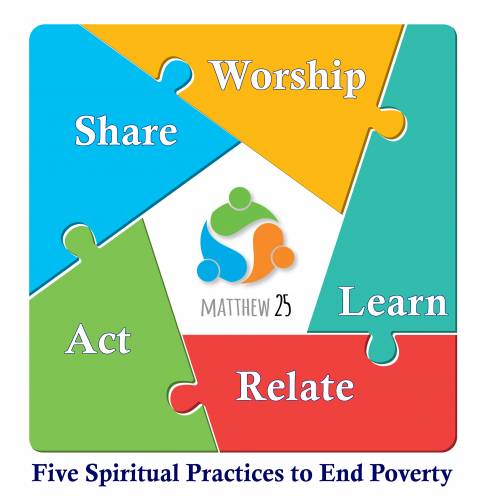To return to the overall Matthew 25 Eradicating Systemic Poverty page, click here.
To download PDFs of PC(USA) Resources list and Action Suggestions organized by the Five Spiritual Practices (worship, learn, relate, act, share) , please click here.
We will prioritize listening to, and responding alongside, communities as they identify needs, organize for solutions, and engage in advocacy for change.
Act Resources
- Learn about the model of Congregation Based Community Organizing, hear stories, and connect to possible CBCOs in your area.
- Use the Holy Discernment toolkit at from the Office of Public Witness to explore the biblical roots for our public policy advocacy and engagement in the public square. Sign up for action alerts that you can take individually and/or share with your congregation.
- Follow the Educate a Child Toolkit practical tools and starting points for congregations to begin direct service and advocacy for education. Designed to start or amend education-oriented ministry or education advocacy, this toolkit can be used online or downloaded.
- Involve children in taking action through activities included in One Great Hour of Sharing materials.
Act Action Suggestions
- Identify trusted, community-based, anti-poverty local organizations and leaders to join their campaigns and follow their lead on calls to actions and community meetings–not just politicians, but school social workers, healthcare providers, community organizers, pastors in different denominations and various sectors of the community.
- Consider joining a community organizing entity. Some suggestions include Direct Action & Research Training Center, Inc. (DART) in 10 states, Industrial Areas Foundation in 24 states, or Faith in Action in multiple locations.
- Consider joining the organizing efforts in your state with the Poor People’s Campaign.
- Advocate for legislation that helps to end poverty locally, in your state, nationally or internationally. Be mindful not to assume we know what is best- let action arise from listening to and building relationships with impacted communities. Choose advocacy that best suits your congregation and set a goal to follow it for the length of time that makes sense. Reflect along the way.
- National foci recommended as legislative priorities by the Poor People’s Campaign include many that have Presbyterian policy and programming history, such as Guaranteed Minimum Wage, Voting Rights/Civil Rights, and Immigration Reform. Choose one or more of the PPC priorities as your focus. For Presbyterian policy connections, see the Advisory Committee on Social Witness Policy.
- Global legislation advocacy, recommended by Bread for the World, could focus on the Global Nutrition Act.
- Office of Public Witness action alerts available at https://www.votervoice.net/PCUSA/campaigns
- Adopt a focused campaign to address root causes of poverty in your community and across the country:
- “End Cash Bail” to stop those who are poor from having more impacts of the criminal justice system than those who can afford bail easily. Contribute to the Bail Project bailproject.org. Read about Presbyterian involvement: pcusa.org/news/2019/6/12/louisville-area-presbyterians-and-their-friends-ra/
- “We Choose Welcome” to support refugees in our community. Posters, resources, and suggestions for advocacy at presbyterianmission.org/we-choose-welcome/. Download an action guide at presbyterianmission.org/resource/choose-welcome-action-guide/.
- “Support Affordable Housing” through community organizing, funding local affordable housing trust funds in your city, and working through local non-profit organizations. To learn more and/or to connect to models of community organizing working on affordable housing, visit pcusa.org/cbco, or watch 7 minute video about housing and Matthew 25 commitments at youtube.com/watch?v=c8EuFMPLJkM.
- “Support Fair Food and Farmworkers” through standing with the Alliance for Fair Food and the Coalition of Immokalee Workers, a long-standing Presbyterian partnership.
- “Help Abolish Medical Debt” for pennies on the dollar. One dollar can abolish $100 worth of medical debt for qualified individuals in the United States. Learn more at RIP Medical Debt.
 To see resources and action steps for other spiritual disciples of eradicating poverty and building communities of well-being, click on one of the other practices. To return to the overall Matthew 25 Eradicating Systemic Poverty page, click here.
To see resources and action steps for other spiritual disciples of eradicating poverty and building communities of well-being, click on one of the other practices. To return to the overall Matthew 25 Eradicating Systemic Poverty page, click here.